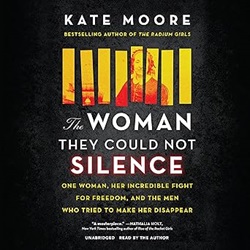
 The Woman They Could Not Silence
The Woman They Could Not SilenceOne Woman, Her Incredible Fight for Freedom, and the Men Who Tried to Make Her Disappear
Review posted August 21, 2024.
Blackstone Publishing, 2021. 14 hours, 37 minutes.
Review written August 1, 2024, from a library eaudiobook.
2024 Sonderbooks Standout:
#5 More Nonfiction
This book is both fascinating and horrifying. It's the story of Elizabeth Packard, whose husband had her locked up in an insane asylum for three years beginning in 1860. It's about her fight for her freedom, for custody of her children, and ultimately to reform laws and the treatment of the "insane."
The story was hard to listen to, because Elizabeth was locked up basically because she developed religious views that disagreed with her pastor husband. And she was too vocal about them. Everything he did was completely legal, and he was able to have her committed to an asylum on his say-so. Even more horrifying was the later corroboration from the superintendent of the facility that he was convinced she was insane, because he based that assurance completely on her opinions, which he did not agree with.
Or another example of her obvious insanity was that she was angry with her husband - the same man who'd put her in the insane asylum when she was completely sane. Because it's not "womanly" to hate your husband.
The book also told about the horrors of the asylum. At first, Elizabeth was in the best ward, but as punishment for speaking up, she got moved to a much worse situation and witnessed much abuse and many horrible things. Any letters she received or sent were confiscated. And she never had any idea how long she would be incarcerated.
Eventually, she was able to get a trial. The way the doctors used her ideas as proof that she was insane was chilling to me. It reminded me of present-day people telling transgender folks they are "confused" - indeed the book included a postscript about modern women being called insane or crazy for their political views.
After she was free, Elizabeth Packard went on to work to change the laws - so that women couldn't be incarcerated on the word of their husbands, so that insane asylums had to be independently inspected, and many other issues. She was free, but she used her powerful voice to help the many others she'd seen who had been victims of the current system.
Not realizing the narrator was the author, I wondered why they picked a narrator with a British accent, but as usual I very much enjoyed listening to that accent. With the one bothersome detail that she didn't pronounce "Packard" the way Americans do, putting more of an emphasis on the second syllable. But that was easily overlooked, as I enjoyed everything else about her reading. The book was obviously scrupulously researched - using Elizabeth's own writings and other contemporary writings and reports to put together the whole story.
It was wonderful to learn about this true American hero, as well as sobering to learn the situation women could find themselves in only 160 years ago.
